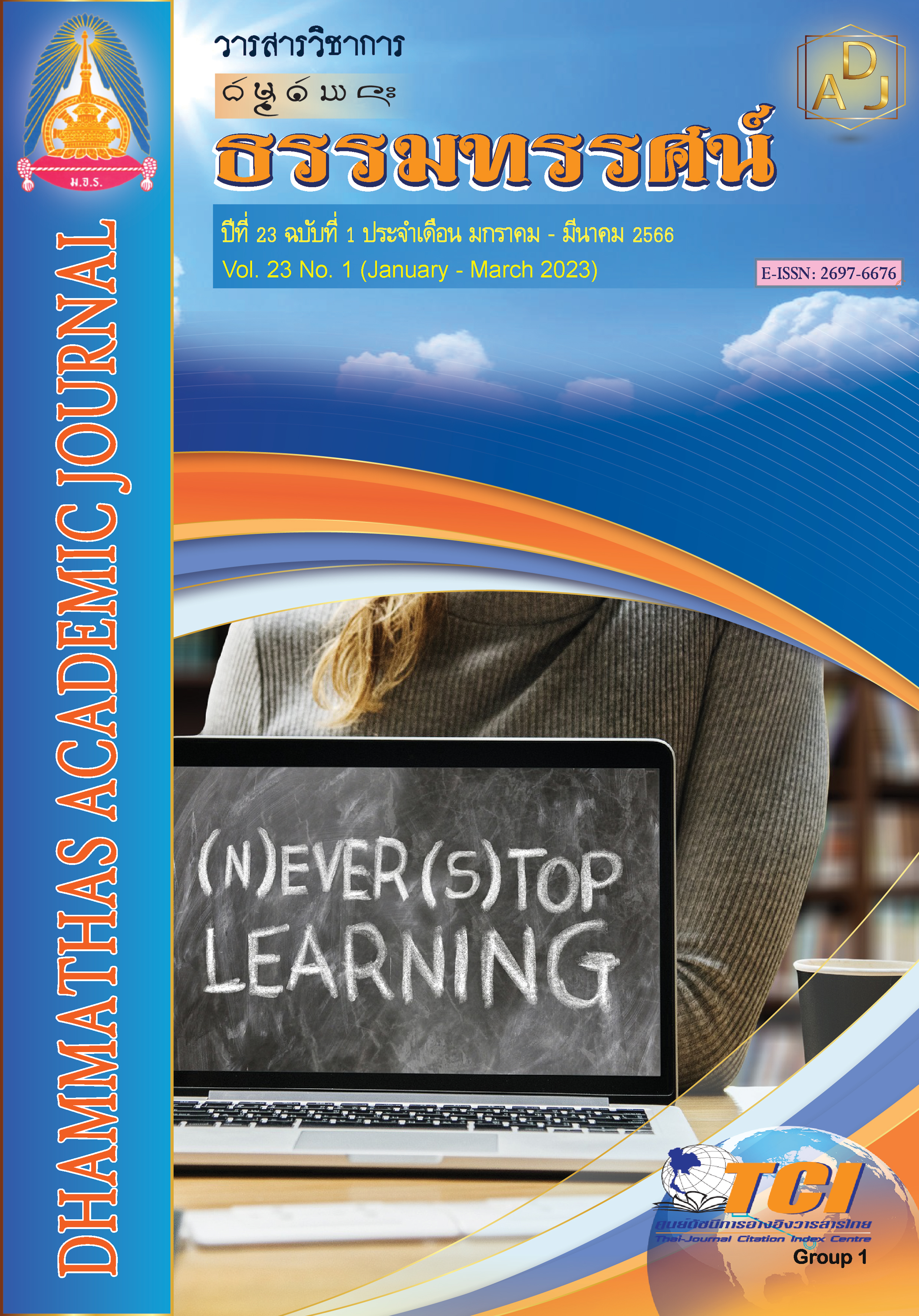Quality and Learning Organization in the Digital Era
Main Article Content
Abstract
This academic article aimed to purpose the development guidelines on learning organizations in digital era in 9 aspects. 1) The guidelines for developing university towards the excellent LO aspects; (1) organization members have high skill and competency in system thinking, (2) joint vision, (3) learn together as a team and 4) innovative design. 2) LO development process In the digital era aspect; (1) analytics, synthesis, planning, systematic design, (2) inspiration, (3) reflection process of development ideas, and (4) complex management potential. 3) Form of goal formulation to formulate a strategic plan and action plan aspect; (1) setting common goal for the whole organization, (2) implementation at the faculty/office level and curriculum, (3) being consistent in terms of policies. 4) The key principles of creating a learning organization in risk management aspect; (1) the principle of fusion of competence, (2) the principle of outward look and (3) the principle of leadership in building intellectual weapons. 5) The index of success for learning organization aspect; (1) ICT inputs, Evaluation Process, (2) Brain Storming, Training, Seminar, Learning Climate and (3) Productivity Research/ Innovation, Network, Knowledge Management. 6) Leadership and Management at all levels that are conducive to learning organizations aspect; (1) Leadership role in leading the organization, (2) Visionary, value, Empowerment, Rewards, Morale. 7) The importance of learning organization and academic goal aspect; (1) developing resources to be a good person, smart and happy, (2) developing creativity and intelligence and (3) developing emotional intelligence. 8) The relationship between the learning organization and the success of the organization aspect; (1) Instructor quality dimension, (2) Curriculum quality standard dimension and (3) Teaching method dimension and 9) The relationship linking the learning organization with organizational health aspect; (1) healthy organization; and (2) imperfect organization.
Article Details

This work is licensed under a Creative Commons Attribution-NonCommercial-NoDerivatives 4.0 International License.
เพื่อให้เป็นไปตามกฎหมายลิขสิทธิ์ ผู้นิพนธ์ทุกท่านต้องลงลายมือชื่อในแบบฟอร์มใบมอบลิขสิทธิ์บทความ ให้แก่วารสารฯ พร้อมกับบทความต้นฉบับที่ได้แก้ไขครั้งสุดท้าย นอกจากนี้ ผู้นิพนธ์ทุกท่านต้องยืนยันว่าบทความ ต้นฉบับที่ส่งมาตีพิมพ์นั้น ได้ส่งมาตีพิมพ์เฉพาะในวารสาร วิชาการธรรม ทรรศน์ เพียงแห่งเดียวเท่านั้น หากมีการใช้ ภาพหรือตารางของผู้นิพนธ์อื่นที่ปรากฏในสิ่งตีพิมพ์อื่นมาแล้ว ผู้นิพนธ์ต้องขออนุญาตเจ้าของลิขสิทธิ์ก่อน พร้อมทั้ง แสดงหนังสือที่ได้รับการยินยอมต่อบรรณาธิการ ก่อนที่บทความจะได้รับการตีพิมพ์References
กุหลาบ ปุริสาร. (2564). ภาวะผู้นำเชิงศรัทธาบารมี: กรณีศึกษา ศ.ดร.นพ.กระแส ชนะวงศ์. ขอนแก่น: เพ็ญพรินติ้ง.
คณะศิลปกรรมศาสตร์ มหาวิทยาลัยทักษิณ. (2557). แนวปฏิบัติการประกันคุณภาพหลักสูตร ประจำปีการศึกษา 2557. สงขลา: มหาวิทยาลัยทักษิณ.
มหาวิทยาลัยราชภัฏนครปฐม. (2562). คู่มือการประกันคุณภาพการศึกษาภายใน พ.ศ. 2562 ระดับคณะและสถาบัน มหาวิทยลัยราชภัฏนครปฐม. นครปฐม: มหาวิทยาลัยราชภัฏนครปฐม.
ยุรพร ศุทธีรัตน์. (2552). องค์การเพื่อการเรียนรู้. กรุงเทพฯ: จุฬาลงกรณ์มหาวิทยาลัย.
วิเชียร ชิวพิมาย. (2550). ภาวะผู้นำคุณลักษณะพิเศษ. เอกสารประกอบการสอน วิชาการบริหารการศึกษา คณะศึกษาศาสตร์ มหาวิทยาลัยวงษ์ชวลิตกุล. นครราชสีมา: มหาวิทยาลัยวงษ์ชวลิตกุล.
_______. (2565). การวางแผนเชิงกลยุทธ์. เอกสารประกอบการสอนวิชานโยบายและแผน. ขอนแก่น: คณะศึกษาศาสตร์และศิลปศาสตร์ วิทยาลัยบัณฑิตเอเซีย.
สำนักงานคณะกรรมการการอุดมศึกษา. (2557). คู่มือการประกันคุณภาพการศึกษาในระดับอุดมศึกษาฉบับปีการศึกษา พ.ศ. 2557. กรุงเทพฯ: ภาพพิมพ์.
Davenport, T. H. (2006). Some Principles of Knowledge Management. Retrieved from https://www.strategy-business.com/article/8776
Davenport, T. H. and Prusak, L. (1998). Working Knowledge: How Organizations Manage What They Know. Boston: Massachusetts: Harvard Business School.
Lee, C. C. and Yang, J. (2000). Knowledge Value Chain. Journal of Management Development, 19(9), 783-793.
Senge, P. M. (2000). The Fifth Discipline: The Art and Practice of the Learning Organization. New York: Doubleday.
Vivienne Collinson and Tanya Fedoruk Cook. (2007). Organizational Learning: Improving Learning, Teaching, and Leading in School Systems. New York: SAGE Publications.

